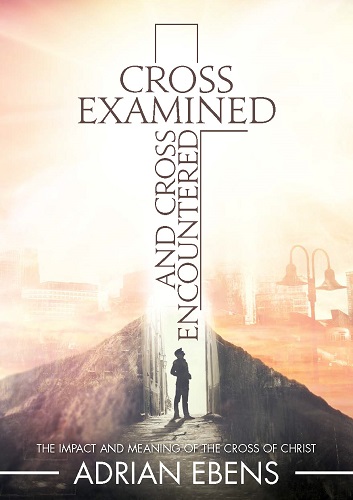Did Christ Really Die On His Cross? - `Agape' versus `The Doctrine of Natural Immortality' by Alexander Snyman
I thought that there are many who will benefit from this tract that was written many years ago by Alexander Snyman, who is now resting in the Lord.
_____________________________
DID CHRIST REALLY DIE ON HIS CROSS?
AGAPE VERSUS THE DOCTRINE OF IMMORTALITY
By Alexander Snyman
Natural Immortality - A Key Deception
Once there is a departure from truth in any area in Scriptural teaching there follows a seemingly endless train of repercussions as one by one other doctrines of the Bible are affected. This is inevitable, since Biblical Truth is an entity which cannot be divided and put into pockets. The various doctrines of the Bible overlap and interlock over and over, each one is related to the others. In fact, it is particularly true of the popular teaching of the natural immortality of the soul, because once this teaching is embraced the mind is immediately closed to a clear understanding of many other truths of the Scriptures. It is our purpose in this presentation to consider some of those tenets most central to the Gospel message which are affected by the immortal-soul idea.
First to be considered will be the teaching of the Scriptures concerning the resurrection. Preaching on this subject has virtually disappeared from the popular pulpits, and with good reason! If, as generally taught, the righteous go to heaven at death, then why the need of a resurrection later? Any attempts to resolve the difficulty by telling of a later reunion of the `soul' with a resurrected body brings only added confusion. It is easier to leave the resurrection alone.
However, to ignore the resurrection doctrine is to bypass one of the most central points of emphasis in the New Testament. When our Lord returns to this earth, the apostle Paul tells us, He will "descend from heaven with a shout, with the voice of the archangel, and with the trump of God: and the dead in Christ shall rise first." 1 Thessalonians 4; 16. This is the voice of Christ Himself. Once, speaking to the Jews, Jesus said, "Marvel not at this: for the hour is coming, in the which all that are in their graves shall hear His voice, and shall come forth; they that have done good, unto the resurrection of life; and they that have done evil, unto the resurrection of damnation." John 5: 28-29.
Those who are resurrected come forth from death, not from life in some celestial paradise. They come up from the graves, not down from heaven. They emerge from a state of unconsciousness, not from an environment of bliss inhabited by vaporous beings. Were they to be recalled from any state of consciousness this could hardly be called a resurrection from the dead. Death implies absence of life, and thus of consciousness.
Paul the apostle lays great stress upon the doctrine of the resurrection. In his defence before Felix, the governor, he said, "there shall be a resurrection of the dead, both of the just and the unjust." Acts 24:15:. And addressing King Agrippa he asked, "Why should it be thought a thing incredible with you, that God should raise the dead?" Acts 26:8. But his profoundest treatment of the subject of the resurrection is given in his letter to the Corinthians, chapter fifteen. Virtually the entire chapter is devoted to driving home this wonderful truth, that the righteous dead are to be raised, and upon them will be conferred `incorruptibility' and `immortality'. Verses 51-54. Paul's reasoning in this chapter is conclusive. If there is no resurrection of the dead, he argues, then "Christ is not risen", and if this is the case then "our preaching is in vain", "we are false witnesses", and "your faith is vain". Verses 18-19. He points out further that there would be no point in a Christian exposing himself to danger or death were there is no resurrection to which to look forward. We may as well "eat and drink, for tomorrow we die." Verses 30-32. In other words, get all you can out of this life, for it is all you will have. Thus the apostle Paul proves how vital to sound Christian doctrine the fact of the resurrection of the dead really is.
All of these arguments not only destroy the idea that there is no resurrection of the dead, but also makes completely incompatible with the resurrection doctrine the idea of a separate conscious existence of `soul' or `spirit'. It is one or the other. The doctrine of the resurrection and the doctrine of the immortality of the soul are mutually exclusive.
Parallel to this question of the resurrection is the whole matter of the disposition of evil and the punishment of evildoers. Belief in the natural immortality of the soul requires a corresponding belief in the perpetuation of sin and sinners throughout the ceaseless ages of eternity, and this in turn requires a belief in a punishment which begins at death and goes on forever. According to this idea, once sin has entered the world, it can never be eliminated. If sinners already possess immortality then God Himself is unable to blot them out of existence. So forever and ever, while ransomed souls sing the praises of Him who created and redeemed, lost souls are giving vent to their feelings of agony and frustration with screams and curses which will be heard throughout eternity. There will never come a time when good and evil, joy and pain, love and hate, life and death will not continue side by side in God's kingdom.
Happily, the Scriptures do not paint such a picture of things to come. We are told of a judgment yet future. Solomon ends his witness to the world with these words: "Fear God and keep His commandments: for this is the whole duty of man. For God shall bring every work unto judgment, with every secret thing, whether it be good or evil." Ecclesiastes 12:13-14. This statement alone is enough to prove that lost sinners are not being punished now. There exists no place of torment now, nor will there be until the end of the world, and then only long enough to exterminate all sin and its effects. The dead are now in their graves, perfectly unconscious. This doctrine of the natural immortality of the soul carries with it the necessary corollary that punishment is going on now in a fiery inferno. But if the judgment is yet future, then it can only be concluded that there are untold millions suffering, some already for millenniums of time, who may learn one day that a mistake has been made in their cases, and they should have been in heaven instead of hell! Or we could ask, "Why a future judgment if judgment has already been rendered"?
Solomon is not the only one of the Bible writers who tell of a future judgment. We read, "It is appointed unto men once to die, but after that the judgment." Hebrews 9:27. And Job says, "For ye say, Where is the house of the prince? And where are the dwelling places of the wicked? Have ye not asked them that go by the way? And do ye not know their tokens, that the wicked is reserved to the day of destruction? They shall be brought forth to the day of wrath." Job 21:28-30. Essentially the same thought is echoed by Peter. "For if God spared not the angels that sinned, but cast them down to hell, and delivered them into chains of darkness, to be reserved unto the day of judgment . . . The Lord knoweth how to deliver the godly out of temptations, and to reserve the unjust unto the day of judgment to be punished." 2 Peter 2:4,9. And Jude tells us: "And Enoch also, the seventh from Adam, prophesied of these, saying, Behold, the Lord cometh with ten thousands of His saints, to execute judgment upon all, and to convince all that are ungodly among them of all their ungodly deeds which they have ungodly committed." Jude 14,15. Isaiah places the judgment in the future: "And it shall come to pass in that day, that the Lord shall punish the host of the high ones that are on high, and the kings of the earth upon the earth." Isaiah 24:21. Our Lord Himself taught a judgement yet to come: "For the Son of man shall come in the glory of the Father with His angels; and then He shall reward every man according to his works." Matthew 16:27. And again: "He that rejecteth me, and receiveth not my words, hath One that judgeth him: the word that I have spoken, the same shall judge him in the last day." John 12:48.
A belief in the soul's natural immortality is at variance with all these texts, and many more which could be cited. For reasons already given, it is impossible to reconcile the idea of men who have died continuing in a state of consciousness somewhere, whether in bliss or torment, implying that in their cases judgment has already been rendered, with the clear teaching of the Scriptures that the judgment is still in the future. Like the tentacles of some cancer, this key deception, the doctrine of natural immortality, reaches everywhere, and destroys the entire structure of Bible truth regarding God's plan for the world.
We do not read that the wages of sin is eternal torment in the fires of hell, but death, which is the complete absence of life and consciousness, the final and complete extinction of being. "Wherefore, as by one man sin entered into the world, and death by sin: and so death passed upon all men, for that all have sinned." Romans 5:12. Thus all are under the death penalty because of sin. "But God commendeth His love toward us, in that, while we were yet sinners, Christ died for us." Romans 5:8. Redemption, atonement, can be accomplished only by having Someone die in the place of fallen man, and thus effect the reconciliation which means salvation for all who choose to respond to this demonstration of God's love. "For if, when we were enemies , we were reconciled to God by the death of His son, much more, being reconciled, we shall be saved by His life. And not only so, but we joy in our Lord Jesus Christ, by whom we have now received the atonement." Romans 5:10-11. Upon the Substitute, the Surety, were our sins placed, for "the Lord hath laid upon Him the iniquity of us all." Isaiah 53:6.
Central to the salvation theme is the fact that Christ took upon Himself the penalty for sin which we would have had to suffer. It is the one golden thread which runs all the way through the sacred pages of the Scriptures. As the Pen of Inspiration tells it:
"Christ was treated as we deserve, that we might be treated as He deserves. He was condemned for our sins, in which He had no share, that we might be justified in His righteousness, in which we had no share. He suffered the death which was ours, that we might receive the life which was His. 'With His stripes we are healed.'" (Desire of Ages page 25.)
Now if the `wages of sin is death', and Christ made full atonement for sin at the cross, it is obvious that His agony and death on Calvary fully satisfied the demands of Heaven's justice in meeting the problem of a transgressed law. But if, as some claim, sinners are to be tortured in a flaming cauldron for all eternity because of their sins, the question immediately arises, Why is Christ not now suffering the agony of eternal torment, if such is indeed the penalty for sin? For to save this lost world God saw that it was necessary for a Substitute to be provided who would take upon Himself the total guilt and punishment for the sin of the entire human race, and that only in this way could mankind be saved. Thus the fact that Christ is not now suffering eternal torment should be enough to show that 'the wages of sin is death' and not everlasting agony in the fires of hell.
However, someone may ask here, and reasonably, If Christ did not take upon Himself eternal torment, is it not equally true that He did not suffer the penalty of eternal death, but is even now alive, and at the right hand of the Father? Certainly when the Bible tells us that "the wages of sin is death", this had to mean eternal death, eternal separation from God, not death for a time and joyous resurrection. Otherwise the wicked, raised to life at the close of the thousand years (Revelation 20:5,7,8) could rightly say, "We have already died once. We have paid the price for our sins. It is not right that we should die again." The answer, very simply, is that death as the wages of sin means forever and ever, for all eternity. But then how can it be said that Christ died for our sins, and paid the full price for our sins, thus effecting a full and complete atonement, and yet was resurrected the third day and has been alive ever since?
This question brings us not only to the heart of Atonement, but to the very heart of God, the revelation of His character, the virtual centre point of the universe. It involves an understanding of the great love-motif of the Word of God, an area which has been, sad to say, very much neglected and also greatly misunderstood. This will be considered in a little more detail.
Different words for 'love' appeared in Greek over the early centuries. In Platonic times EROS was the highest concept of Greek philosophical thought, a love of the purest, noblest, kind. But EROS was based upon a self-centred concept, and so could not rise above the level of man's highest capabilities, which, being sin-based, could not ascend to the point of a true grasp of the love which the New Testament writers were attempting to portray. In fact, the direction of EROS could only be downward, so that by New Testament times its meaning had degraded to a level of baseness. It was completely unsuitable for New Testament use.
Other words for `love' made their appearances: STORGOS, a word with a very narrow meaning, which is found only twice in the New Testament in its combinative form ASTORGOS (without natural affection, Romans 1;31, 2 Timothy 3:3), and PHILOS, which appears many times in its various forms (verb PHILEO), and indicates a warm, tender love of a friend or close family member. This word finds a place in the New Testament where the closeness and tenderness of members of the Christian family is described.
But what developed into the great love-word of the New Testament was the word AGAPE (ah-GAH-pay). Comparatively obscure at the time, it nevertheless came to embody a meaning which made it unique even among all the love words of the world's languages. Other languages today, English included, have to explain its meaning since there is no equivalent word in any language anywhere on earth. AGAPE means essentially ultimate selflessness. It makes all consideration for personal wellbeing secondary. This means that, if necessary, such love would choose complete self-emptying, eternal loss, eternal negation, eternal death. AGAPE described the very character of God. "God is AGAPE (love)." 1 John 4:8.
Could this explain what really happened on the cross at Calvary? Remember, for Christ to redeem a lost world required that He pay the price for sin completely. He must stand before God in the sinner's place, and thus be put in the position of a condemned sinner and no longer a beloved Son. He would then have to bear God's frown for disobedience and wrath against sin and no longer His love for His only Son. This in turn meant that He must die, be deprived of life and consciousness, not just for three days, but forever. Further, this meant that all hope of a glad resurrection and reunion with His Father in heaven must be abandoned. Any thought of ever again enjoying the environment of heaven must be set aside completely. To take the sinner's place meant that He must endure the agony of eternal separation from God. The penalty for the transgression of a holy and just law involved all this and much more.
AGAPE is a love so great that the Godhead was willing to have all this take place on the cross of Calvary in order to make redemption for lost souls possible. And remember that the Father did not suffer any less than did the Son in that agony of Gethsemane and Calvary.
Now, did all this, and more, actually take place in the Atonement? Can it be averred that Christ on the cross of Calvary did indeed pay a price for man's redemption which was in every way equivalent to the eternal death which the penalty for sin required? Fortunately, to this question we can reply, "Yes, in every way!" Consider how Ellen G. White described the agony of our Lord on the cross:
"Satan with his fierce temptations wrung the heart of Jesus. The Saviour could not see through the portals of the tomb. Hope did not present to Him His coming forth from the grave a conqueror, or tell Him of the Father's acceptance of the sacrifice. He feared that sin was so offensive to God that their separation was to be eternal. Christ felt the anguish which the sinner will feel when mercy shall no longer plead for the guilty race." (Desire of Ages page 753.)
Simply put, we can say that Christ died the equivalent of the `second death' on the cross at Calvary, the death from which there is no resurrection. (See Revelation 20:6,9,14.) Further we are told:
"The withdrawal of the divine countenance from the Saviour in this hour of supreme anguish pierced His heart with a sorrow that can never be fully understood by man. So great was this agony that His physical pain was hardly felt." (ibid.)
Many there are in the Christian world today who do not begin to understand what happened on Calvary. To them the Atonement involved no more than the physical agonies of a crucifixion. Terrible as they are, they do not, by any stretch of the imagination, stand in the same category as those mental and emotional agonies which Christ endured. Many believe that Jesus and the penitent thief enjoyed a glad reunion in the realms of glory only minutes after the crucifixion itself. And what is at the bottom of this serious error is the doctrine of natural immortality. This is why, in the matter of the Atonement more than any other, this doctrine is seen to be the key deception that it is. Or to put it another way, it can be said that there is no way in which Atonement can be fully understood by any who believe in the doctrine of the soul's immortality.
AGAPE and its antithesis EROS, have been critically researched by Anders Nygren, a Swedish Lutheran bishop, in his book "AGAPE AND EROS". It is a classic in its field. And it is interesting to note that Nygren finds no possible room for an immortal soul doctrine, or any of its related tenets or philosophies, in the AGAPE motif of the New Testament. He says in one significant paragraph:
"This conception of the double nature of man, of the Divine origin and quality of the soul, its liberation from the things of sense, and its ascent to its original Divine home, is the common basis on which every theory of EROS rests. Around this basic idea, however, a whole series of characteristic ideas group themselves, all intimately connected with the EROS motif, such as belief in a pre-existent Fall, the conception of the body as the prison-house of the soul, the idea of the transmigration of the souls, belief in the soul's natural immortality; and hand in hand with these go the basic mood of asceticism and the mystical-ecstatic way of salvation." (Agape and Eros page 164.)
Another area in which the immortal-soul idea has brought confusion and distortion is in the vital New Testament teaching of the second coming of Christ. This `blessed hope' (Titus 2:13) as it is known to many, has been virtually destroyed by the natural immortality teaching. Christ's second coming is tied in with such earth-shaking events as the righteous dead, the translation of the righteous living, and the related experience of the receiving of the heavenly rewards. But if man's reward has already been given him at death, then why the need for translation and resurrection? It is useless to argue that this will be a time for the reuniting of the `body' with the `soul', for how can this be regarded as some kind of a reward, since immortal-soul teachers generally look upon the body as the place where the soul is imprisoned and longs to be set free. (One book on the subject is entitled `The Imprisoned Splendour'). Surely a `soul' would feel bitter disappointment at having been reunited with the body after enjoying years, perhaps eons of ecstatic bliss! Inevitably, these ideas have made it impossible to keep alive the idea of a `blessed hope' of the soon return of Christ on the clouds of glory. All expressions of glad expectation, such as `near, even at the door', have lost their meaning in the fog of philosophies which teach of airy entities floating about in a spirit world of eternal bliss. If the righteous of all ages are already enjoying their reward and basking in the loveliness of Christ's eternal presence, then where is the excitement in hoping to meet Him on the clouds of glory at some time in the future? It is the imminence of Christ's return which fills His disciples with the gladness of joyful anticipation. The truth-destroying doctrine of the natural immortality has rendered all this meaningless.
To reveal and demonstrate God's true character to the world, `His character of love', is the task of those who are to give the message of warning to this dying world. COL 415. How could this ever be done if, at the same time, He is to be portrayed as One who will torture sinners for every passing age of eternity? Again another of the deceptive tentacles of this immortal-soul doctrine is revealed. As a means of destroying virtually all of the great central tenets of the Christian faith, the introduction of idea of natural immortality has turned out to be a Satanic masterstroke! A more effective distortion of truth could hardly be devised. And it will be the task of those who fulfil the prophecy of the Fourth Angel, whose glory is to lighten the earth, to unmask every phase of this key deception and to sound the clarion call of truth to every corner of the globe with its hungering multitudes, and thus prepare a people for the glorious return of our Lord.





